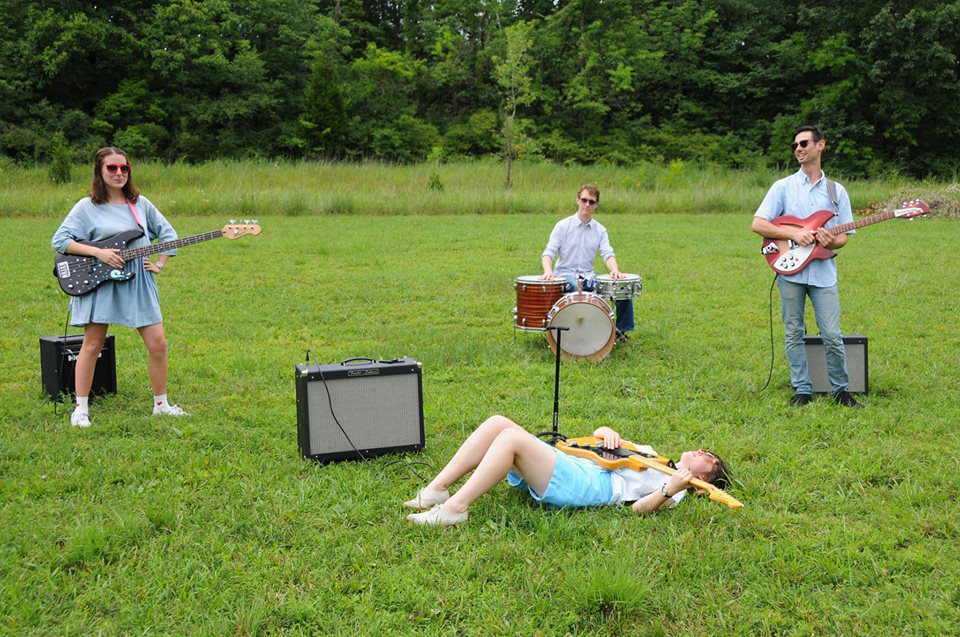Ziemba Grieves For Her Father On Christmas-Tinged LP Unsubtle Magic


“Destabilizing.” That’s the single word René Kladzyk says best encompasses her experience after the death of her father and through rising flood waters of grief. The singer-songwriter, best known under her musical pseudonym Ziemba, lost her father in early 2020 after he spent two weeks in the hospital over the Christmas season.
Her life all but burned to the ground — and with her brand new record, Unsubtle Magic, she sifts through the ash, both literally and figuratively. When her father’s health took a turn for the worse in late 2019, everything began to shift dramatically, even her relationship to holiday-themed music. “Losing a loved one over the holidays made all Christmas music take on a new tinge to me,” Kladzyk tells Audiofemme.
Admittedly, she never intended to make a record stitched with references to such classic Christmas songs as “Silent Night” and “O Holy Night” but perhaps it was a necessary conduit of catharsis to confront her pain so boldly and brutally as possible. “I just kept writing songs that had this holiday frame or holiday lens. That was the context of my dad’s death,” she recognizes.
Beyond her father’s death, Kladzyk also experienced the loss of an aunt, uncle, and good friend. “My experience is not all that unique. A lot of people have really had to grapple with mortality and loss. It’s like the ground falls out from underneath you, and you have to relearn how to stand,” she says. “I wonder about all the different ways that people are going to be struggling this holiday season.”
In the weeks and months immediately following her father’s death, Kladzyk scrawled out the stray lyric and melody, but it wasn’t until late 2020 that she finished the first song. “Sandia Crest” finds her wondering, “Are we truly gone when we go?” over a bedrock of wind instruments and piano, making a lyrical reference to scattering her aunt’s ashes, which she says was “kind of a complicated process.”
“She died tragically, too,” Kladzyk recalls. “She had been a really bad alcoholic for many years, and I had stopped talking to her. She was a big part of my childhood, but in adulthood, I ended up stopping talking to her, as most of my family did. We all were estranged from her, which is really sad. She had very serious mental health issues — and she was alone when she died.”
As a result, the performance is sullen and weighted down, like shoving a boulder into the ocean. All the sorrow and the heartache bubbles around her as she sings, “The last time I heard her voice before she lost her soul/A goodbye to the swirling skies, swallowed by the stars,” bathing in the moment, simply existing without any concrete answers.
Kladzyk prompts another investigation into the afterlife with “Will You Haunt Me?” in which she retraces the moment when it “hit me that [my father] was actually going to die. We had to make the decision to take him off life support, and it was very fraught and confusing,” she recalls. “At first, they were really optimistic, but it quickly changed when he didn’t wake up. I remember walking down the hospital hallway and feeling my head hanging low in a way that it never had before. I don’t even know how to describe it. But it was like this utterly defeated feeling of helplessness that there’s nothing I can do.”
Meanwhile, the world around her continued to flicker right, as there were “literally babies being born. Every time a baby was born, they would play a little melody from ‘Rockabye Baby’ throughout the entire hospital. So you could always hear when a baby was born,” she says.
As her father died, the song’s sweet, bright melody washed over her. “It was a reminder that everybody’s just going about life,” she reflects. “Life is happening all around me, and my life had totally collapsed.”
The album cover, designed by Robert Beatty with art created by Dian Liang, frames her father’s final moments with a glimpse into the sun’s glaring, hopeful rays. “It’s this moment of looking out the hospital window to watch the sunrise on Christmas morning and trying to feel some amount of hope in it,” she explain.
Unsubtle Magic, co-produced with Don Godwin, relies heartily on “devastating defeat and overwhelming sadness” but filters the experiences through twinges of “sweetness and a feeling of home,” she explains. With “A Nightmare,” for example, Kladzyk observes the literal caving in of her childhood home, which her father bought in the ’70s. In 2020, she and her sister “had this incredibly painful problem of trying to deal with this property,” she says. In the song’s most incisive depiction of her ongoing struggle to cope, she sings with a quivering lip, “Part of me might die here.”
It’s a nail in the coffin, to say the least. “It felt like a whole new way of losing him,” she adds. “It was like losing the metaphysical home and physical home.”
She remembers the moment like it was yesterday. Kladzyk returned to Michigan to attend to things while her uncle was dying, so not only did she say final goodbyes but she closed an important chapter of her life. It was 17 degrees out, and snow capped decayed architecture and rotting beams offered a sobering depiction of everything in her life. “The second floor was caving into the first floor and I was running down the stairs as I heard the floor starting to cave in. I ran out of the house in a panic, and that’s the last time I ever went inside that house,” she recalls. “I was actually in the house, and the feeling was like it was falling in. My dog got loose in the yard, and it was really scary and overwhelming and sad.”
“Time doesn’t freeze just ’cause you want it to,” Kladzyk sings on “Time Doesn’t Freeze,” the exact phrase her sister said to her when dealing with the ramshackle homestead. “My dad just kind of left it as though it would stay how it was. He often wouldn’t deal with things, and he would just put it off as though you could keep putting it off forever. If we hadn’t sold it, the town was about to condemn it. It was a huge burden to put on us, because my dad hadn’t maintained it and hadn’t cleaned it out. Then, it was this emotional burden of not knowing if dad had things in there that were of value to him or would be of value to us.”
Furthermore, the piano-laced song grabbles with “the nature of change and entropy, and just how there’s no way to argue with it — and all the ways that silly humans try to pretend we can. We can try to hold onto a moment forever, but we just can’t. And then we’ll forget.”
“That’s another thing with death; you start really grappling with your own memory. You immediately start realizing all the things that you are slowly forgetting, like what it was like to hug that person,” she continues. “It’s a gradual process of going from being a very clear image in your mind’s eye to being a fuzzy image. That’s a horrible feeling. But it’s unavoidable. You can do things to improve your memory, like learning language or whatever, but you can’t bring that person back. You can’t feel the feeling again, except maybe in a dream, if you’re lucky.”
Kladzyk keeps her father’s memory alive through using the same family piano, now residing in her El Paso home, that she played growing up and her father used in his own musical career. “When my mom got pregnant, he just quit playing music entirely. He was operating at a time when the financial hurdles to record were much greater. So, even though he wrote and did demo recordings of tons and tons of songs, he only captured recordings with maybe four songs. During his 12-year musical career, he was a touring musician and had a circuit that he played and made a good living.”
Now, in possession of a collection of tapes, only four of which were complete, basic recordings, she found herself drawn to “Set In Ice,” which her father wrote in 1974. “I tried out a number of songs with the idea of covering them for this album. I really liked where [this song] sat in my voice. I didn’t change the key for that one, and I really liked how, thematically, it fit in the album,” she says.
One particular lyric struck her most. “Living by myself for so very long/Get up every morning just to sing these songs,” she sings amidst a flurry of percussion and guitar. Surprisingly, the visual brought her great comfort, “to imagine my dad in the ‘70s having those same feelings that I was having now. It felt like a way to connect to him, and it feels that way playing his songs, like a new way to get to know him and expand my relationship to a version of him that I never knew.”
Her father never spoke much about his musical days, except to “drop a crazy bomb” like the time he said he “went over to Tom Waits’ apartment, and the whole floor was covered in Burger King wrappers,” she shares with a laugh.
Unsubtle Magic is fraught with emotional tension. Kladzyk both surrenders to her grief and pushes to extricate herself from it. It’s that vital tug of war that acts as a heavy duty glue to keep her from falling apart, shockwaves vibrating through songs like “Only Lonely Christmas,” “Fear,” and a driving performance of “I’ll Be Home for Christmas.”
The holidays are in full swing, and a lyric in “Sandia Crest” ensnares these complicated strands of her emotional state. “I hope to someday love Christmas,” she sings, the phrase nearly swallowing her whole. It’s hopeful but doesn’t skirt the pain.
In our conversation, she admits to feeling like “I am doing a great job of forcing myself to get over wanting to cry every time I heard a Christmas song. While it was all happening, that first holiday season, literally hearing any Christmas song made me feel this pain in my stomach, a sadness like everything that was gone would never be again — that sort of thing. I think I’ve done a good job of reminding myself all of what I love about this time of year and the magic I’m still working on.”
Raised Catholic, Kladzyk doesn’t gravitate to the religious iconography or gift-giving aspects of the season. Rather, it’s about “believing in impossible things or believing in mysterious, beyond the realm of the material things in some ways. It’s been more like smelling pine in the air and the winter experience. It has always held this magic for me.”
Unsubtle Magic is Kladzyk’s lifeline. It’s a fearless, imposing, and visceral snapshot of her life in the throes of inevitable tragedy. It’s not the sort of record you’d expect in the Christmas season, but it’s one with unfortunate universal appeal — and one the entire world needs to witness.




